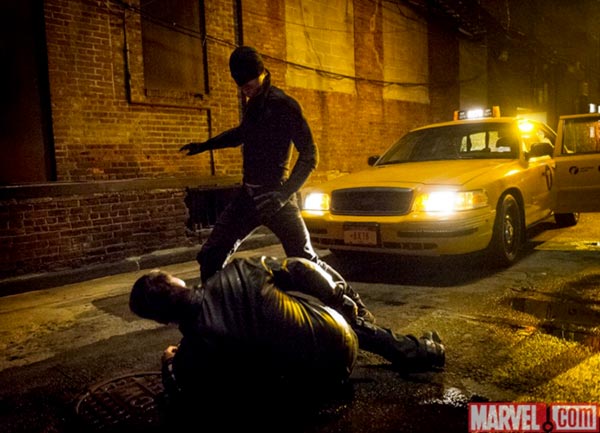
Netflix’ Daredevil
REVIEW by Richard Rivera
Riveting. Powerful. Commanding. Netflix’ Daredevil is not the Daredevil comic of old that was masterfully drawn by Jack Kirby (who also breathed life into the Fantastic Four), and which I read as a kid in New York City. It is the embodiment of the unique character created by Stan Lee and Bill Everett that has now been absorbed into the ethos of the darkest graphic novels, and regurgitated in this Netflix series as a new bloody and gruesome incarnation. The basic story is familiar but solid, and the characters are compelling, especially the evil crime boss who is unseen, yet a baleful presence, in the first few episodes.
The reluctant hero/protagonist, Matt Murdock (Charlie Cox), has the gripping backstory of a child of 9 who heroically saves a man’s life, but in the process is doused with toxic chemicals that destroy his eyesight and also endow him with powers. His father, a single parent who makes his living as a boxer and is oppressed by a corrupt system, is the core figure in the child’s life.
In adulthood Murdock becomes an attorney with a strong moral ethic, who together with his longtime college friend, “Foggy” Nelson (Elden Henson), opens a fledging law firm to champion the causes of the indigent.
The villain, Wilson Fisk, a crime boss with major ambitions to shape the city in his image, looks exactly as Jack Kirby drew him as Marvel Comics’ Kingpin. But unlike the comic book, he is far from the stereotype. Although given to bombast and pronouncements he makes the viewer understand his passion for changing the city into a “better place.” He is not all monster; he can be tender, loves, and is loved.
The series has outstanding performances by the core cast that includes Charlie Cox, Deborah Ann Woll, Elden Henson, Vincent D’Onofrio, and Rosario Dawson.
While the plot and backstory are gripping, the early episodes of Season One are punctuated now and again by brief, yet extremely gruesome, over-the-top graphic violence. It is not gratuitous, but extreme nonetheless.
The opening credits where blood drips and covers the city, says it all. And as a New Yorker it is easy to see why this kind of tale of disenfranchised citizens, a powerful crime boss, and a vigilante hero resonates with today's audience, especially for people who live in urban centers without hope for improvement—where the political and corporate “powers that be” do not care about the existence of a dwindling middle class, and center all of the city’s benefits on the wealthy few.
Increasingly in major urban centers like New York, real estate goes to develop multi-million dollar condos that are largely uninhabited and used as tax write-off's by globe-trotting billionaires and luxury businesses, while the working poor cannot make ends meet, there is little or no affordable housing, taxes continue to skyrocket, and food prices are so high that it is easy to have a poor diet.
The most interesting thing about Daredevil is that it is a parable for what actually goes on in places like New York, minus the hero. There are ruthless elements that seek to oppress the poor, sustain the rich, and leave nothing in between for anyone except themselves. Daredevil is engrossing, with compelling characters that are drawn beyond the typical stereotypes, and a cogent story line that moves it along at a sustainable pace. Intermittently, it also has scenes distinguished by exceptional dialogue. As in episode nine, where Murdock speaks to his parish priest, Father Lantom (Peter McRobbie), who is more friend than confessor, regarding his moral dilemma:
Father Lantom: “. . . few things are absolute, Matthew. Even Lucifer was once
an angel. That is why judgement and vengeance are best left to God. Especially
when murder is not in your heart.”
Murdock: “I know my soul is damned if I take his life. But if I stand idle, if I let
him consume the city, then people will suffer and die.”
Father Lantom: “There is a wide gulf between murder and inaction. Another man’s
evil does not make you good. Men have used the atrocities of their enemy to justify
their own throughout history…”
The one glaring problem with Daredevil is that at times it has brief but extremely intense and gruesome brutality. The redeeming factor that somewhat outweighs the violence are the motivations of well-defined, touching characters; and our protagonist’s reluctance to take a life, which ultimately causes him great pain.
Daredevil is a graphic novel brought to life. It is not light comic book fare, and it is not the Daredevil of the 60s that I used to read. It is a very dark yet compelling story.
May 15, 2015

Your feedback and comments are appreciated. See Contact page for e-mails.
Camera Sense Archives
APRIL 2015
Book review
iPad software
Movie review
Underwater dual-use camera review
Photo commentary
Book review
PhotoTech commentary
The Interview, movie review
Photo enhancement or management
MAY 2015
Photo Tech commentary
Photo/Art commentary
Camera review
TV series review
JUNE 2015
JULY 2015
AUGUST 2015
SEPTEMBER 2015
OCTOBER 2015
NOVEMBER 2015
DECEMBER 2015
Copyright © 2015 Richard Rivera & Rivera Arts Enterprises All rights reserved. No copying or reproduction of any kind without express written permission from Richard Rivera
Legal Disclosure Camera Sense and Eagles of New York are trademarks of Elk Partners LLC